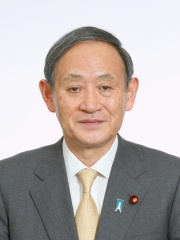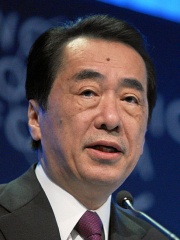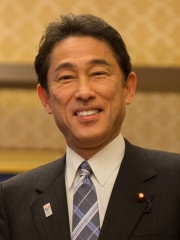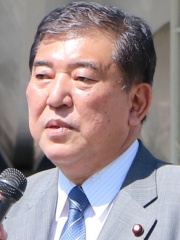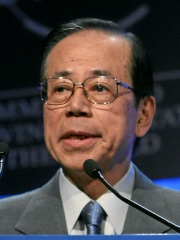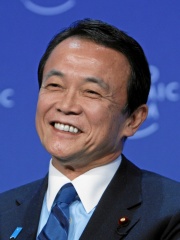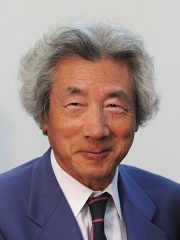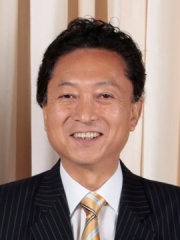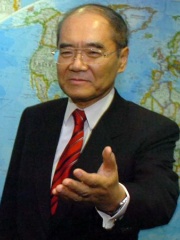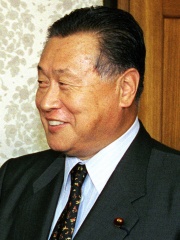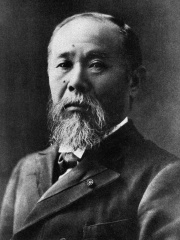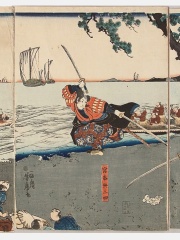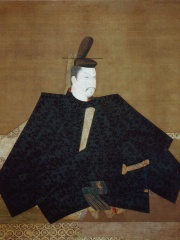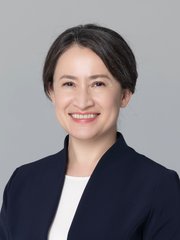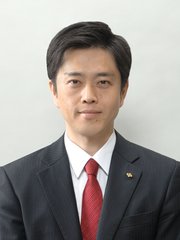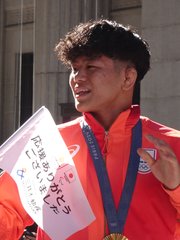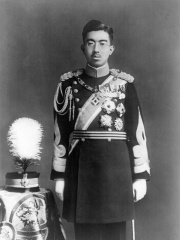
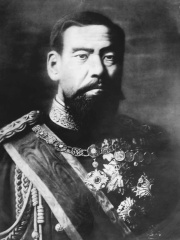
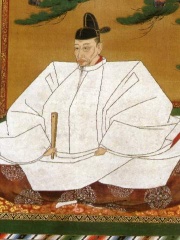
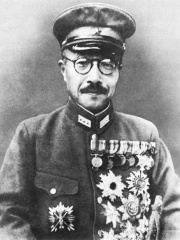
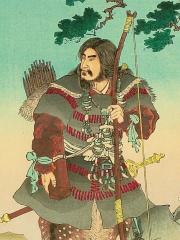
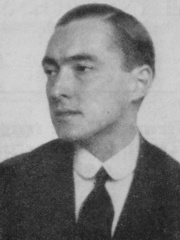
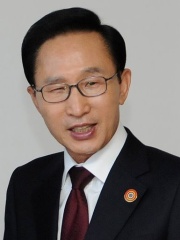
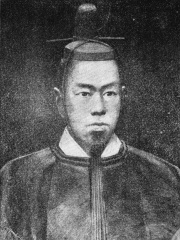
The Most Famous
POLITICIANS from Japan
This page contains a list of the greatest Japanese Politicians. The pantheon dataset contains 19,576 Politicians, 379 of which were born in Japan. This makes Japan the birth place of the 10th most number of Politicians behind Türkiye, and China.
Top 10
The following people are considered by Pantheon to be the top 10 most legendary Japanese Politicians of all time. This list of famous Japanese Politicians is sorted by HPI (Historical Popularity Index), a metric that aggregates information on a biography's online popularity. Visit the rankings page to view the entire list of Japanese Politicians.

1. Hirohito (1901 - 1989)
With an HPI of 85.25, Hirohito is the most famous Japanese Politician. His biography has been translated into 135 different languages on wikipedia.
Hirohito (裕仁; 29 April 1901 – 7 January 1989), posthumously honored as Emperor Shōwa (昭和天皇, Shōwa Tennō), was the 124th emperor of Japan according to the traditional order of succession, reigning from 1926 until his death in 1989. He remains the longest-reigning emperor in Japanese history and one of the longest-reigning monarchs in the world. As emperor during the Shōwa era, Hirohito presided over the rise of Japanese militarism, the Japanese invasion of Manchuria, the Second Sino-Japanese War, the Asia-Pacific theater of World War II, and the nation's postwar economic miracle. Hirohito was born during the reign of his paternal grandfather, Emperor Meiji, as the first child of Crown Prince Yoshihito and Crown Princess Sadako (later Emperor Taishō and Empress Teimei). When Emperor Meiji died in 1912, Hirohito's father ascended the Chrysanthemum Throne, and Hirohito was proclaimed Crown Prince of Japan in 1916, making him the heir apparent. In 1921, he made an official visit to six European countries, marking the first time a Japanese crown prince had traveled abroad. Due to his father's ill health, Hirohito became Sesshō of Japan (regent) that same year. In 1924, he married Princess Nagako Kuni, with whom he later had seven children: Shigeko, Sachiko, Kazuko, Atsuko, Akihito, Masahito and Takako. He became emperor upon his father's death in 1926. As Japan's head of state, Emperor Hirohito oversaw the rise of militarism in Japanese politics. In 1931, he raised no objection when Japan's Kwantung Army staged the Mukden incident as a pretext for the invasion of Manchuria. Following the onset of the Second Sino-Japanese War in 1937, tensions steadily grew between Japan and the United States. After Hirohito formally sanctioned his government's decision to go to war against the U.S. and its allies on 1 December 1941, Japan entered World War II upon its military's attack on Pearl Harbor as well as attacks on other U.S. and British colonies in the region. After the atomic bombings of Hiroshima and Nagasaki and the Soviet invasion of Japanese-occupied Manchuria, Hirohito called upon the Imperial Japanese Armed Forces (IJAF) to surrender in a radio broadcast on 15 August 1945. The extent of his involvement in military decision-making and his wartime culpability remains a subject of historical debate. Following Japan's surrender, Emperor Hirohito was never prosecuted for war crimes at the International Military Tribunal for the Far East (IMTFE), even though the war had been waged in his name. After the surrender, Japan came under Allied occupation, administered primarily by the United States. The Supreme Commander for the Allied Powers, U.S. General Douglas MacArthur, believed that a cooperative emperor would facilitate a peaceful occupation and support U.S. postwar objectives. MacArthur therefore excluded any evidence from the tribunal that could have incriminated Hirohito or other members of the Imperial House of Japan. In 1946, Hirohito was pressured by the Allies to renounce his divinity. Under Japan's new constitution, drafted by U.S. officials and enacted in 1947, his role as emperor was redefined as "the symbol of the State and of the unity of the People". Upon his death in January 1989, he was succeeded by his eldest son, Akihito, beginning the Heisei era.

2. Emperor Meiji (1852 - 1912)
With an HPI of 82.26, Emperor Meiji is the 2nd most famous Japanese Politician. His biography has been translated into 83 different languages.
Mutsuhito (睦仁; 3 November 1852 – 29 July 1912), posthumously honored as Emperor Meiji (明治天皇, Meiji Tennō), was the 122nd emperor of Japan according to the traditional order of succession, reigning from 1867 until his death in 1912. His reign is associated with the Meiji Restoration of 1868, which ended the Tokugawa shogunate and began rapid changes that transformed Japan from an isolationist, feudal state to an industrialized world power. Emperor Meiji was the first monarch of the Empire of Japan, and presided over the Meiji era. At the time of Mutsuhito's birth, Japan was a feudal and pre-industrial country dominated by the isolationist Tokugawa shogunate and the daimyō subject to it, who ruled over Japan's 270 decentralized domains. The opening of Japan to the West from 1854 fueled domestic demands for modernization, and when Mutsuhito became emperor after the death of his father Emperor Kōmei in 1867, it triggered the Boshin War, in which samurai (mostly from the Chōshū and Satsuma Domains) defeated the shogunate and restored power in his name. Documents issued during his reign include the Charter Oath of 1868, Meiji Constitution of 1889, Imperial Rescript to Soldiers and Sailors of 1882, and Imperial Rescript on Education of 1890, in which he was advised by a group of oligarchs known as the genrō. Other major events which occurred during his reign include the establishment of the Cabinet in 1885, Privy Council in 1888, Imperial Diet in 1890, and military victories over China in the First Sino-Japanese War and over Russia in the Russo-Japanese War. Taiwan and Korea were annexed in 1895 and 1910, respectively. Emperor Meiji died in 1912, and was succeeded by his eldest son, Yoshihito.

3. Toyotomi Hideyoshi (1536 - 1598)
With an HPI of 81.12, Toyotomi Hideyoshi is the 3rd most famous Japanese Politician. His biography has been translated into 71 different languages.
Toyotomi Hideyoshi (豊臣 秀吉; Japanese pronunciation: [to.jo.to.mʲi (|) çi.de(ꜜ).jo.ɕi], 27 March 1537 – 18 September 1598), otherwise known as Kinoshita Tōkichirō (木下 藤吉郎) and Hashiba Hideyoshi (羽柴 秀吉), was a Japanese samurai and daimyō (feudal lord) of the late Sengoku and Azuchi-Momoyama periods and regarded as the second "Great Unifier" of Japan. Although he came from a peasant background, his immense power earned him the rank and title of Kampaku (関白, Imperial Regent) and Daijō-daijin (太政大臣, Chancellor of the Realm), the highest official position and title in the nobility class. He was the first person in history to become a Kampaku who was not born a noble. He then passed the position and title of Kampaku to his nephew, Toyotomi Hidetsugu. He remained in power as Taikō (太閤), the title of retired Kampaku, until his death. It is believed, but not certain, that the reason he refused or could not obtain the title of shogun (征夷大将軍), the leader of the warrior class, was because he was of peasant origin. Hideyoshi rose from a peasant background as a retainer of the prominent lord Oda Nobunaga to become one of the most powerful men in Japanese history. He distinguished himself in many of Nobunaga's campaigns. After Nobunaga's death in the Honnō-ji Incident in 1582, Hideyoshi defeated his assassin Akechi Mitsuhide at the Battle of Yamazaki and became Nobunaga's successor. He then continued the campaign to unite Japan that led to the closing of the Sengoku period. Hideyoshi became the de facto leader of Japan and acquired the prestigious positions of daijō-daijin and kampaku by the mid-1580s. He conquered Shikoku in 1585 and Kyūshū in 1587, and completed the unification by winning the Siege of Odawara in 1590 and crushing the Kunohe rebellion in 1591. With the unification of Japan complete, Hideyoshi launched the Japanese invasions of Korea in 1592 to initial success, but eventual military stalemate damaged his prestige before his death in 1598. Hideyoshi's young son and successor Toyotomi Hideyori was displaced by Tokugawa Ieyasu at the Battle of Sekigahara in 1600 which would lead to the founding of the Tokugawa Shogunate. Hideyoshi's rule covers most of the Azuchi–Momoyama period of Japan, partially named after his castle, Momoyama Castle. Hideyoshi left an influential and lasting legacy in Japan, including Osaka Castle, the Tokugawa class system, the restriction on the possession of weapons to the samurai (the sword hunt), and the construction and restoration of many temples, some of which are still visible in Kyoto.

4. Hideki Tojo (1884 - 1948)
With an HPI of 78.95, Hideki Tojo is the 4th most famous Japanese Politician. His biography has been translated into 75 different languages.
Hideki Tojo (東條 英機, Tōjō Hideki; pronounced [toːʑoː çideki] ; 30 December 1884 – 23 December 1948) was a Japanese general and politician who served as Prime Minister of Japan from 1941 to 1944 during the Second World War. His leadership was marked by widespread state violence and mass killings perpetrated in the name of Japanese nationalism. Born in Tokyo to a military family, Tojo was educated at the Imperial Japanese Army Academy and began his career in the Imperial Japanese Army (IJA) in 1905. He served as a military attaché in Germany from 1919 to 1922, and rose through the ranks to become a general in 1934. In March 1937, he was promoted to chief of staff of the Kwantung Army whereby he led military operations against the Chinese in Inner Mongolia and the Chahar-Suiyan provinces. Later in 1938, Tojo was recalled to Tokyo to serve as vice-minister of the army. By July 1940, he was appointed minister of the army in the premiership of Fumimaro Konoe. On the eve of the Second World War's expansion into Asia and the Pacific, Tojo was an outspoken advocate for a preemptive attack on the United States and its European allies. Appointed prime minister on 17 October 1941, he oversaw the Empire of Japan's decision to go to war against the West as well as its ensuing conquest of much of Southeast Asia and the Pacific Islands in the early years of World War II. During the course of the conflict, Tojo presided over numerous war crimes, including the massacre and starvation of thousands of POWs and millions of civilians. After the war's tide decisively turned against Japan, Tojo resigned as prime minister on 18 July 1944. Following his nation's surrender to the Allied powers in September 1945, he was arrested, convicted by the International Military Tribunal for the Far East in the Tokyo Trials, sentenced to death, and hanged on 23 December 1948. To this day, Tojo's complicity in the July 1937 invasion of China, the surprise attack on Pearl Harbor in December 1941 and numerous acts of mass murder have firmly intertwined his legacy with the Empire of Japan's warmongering brutality during the early Shōwa era.
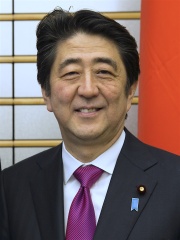
5. Shinzō Abe (1954 - 2022)
With an HPI of 78.56, Shinzō Abe is the 5th most famous Japanese Politician. His biography has been translated into 136 different languages.
Shinzo Abe (21 September 1954 – 8 July 2022) was a Japanese statesman who served as Prime Minister of Japan and President of the Liberal Democratic Party (LDP) from 2006 to 2007 and again from 2012 to 2020. He was the longest-serving prime minister in Japanese history, serving for nearly nine years. Born in Tokyo, Abe was a member of the Satō–Kishi–Abe family as the son of LDP politician Shintaro Abe and grandson of prime minister Nobusuke Kishi. He graduated from Seikei University and attended the University of Southern California before working in industry and party posts, and was elected to the House of Representatives in 1993. Abe was LDP secretary-general from 2003 to 2004 and Chief Cabinet Secretary under Junichiro Koizumi from 2005 to 2006, when he replaced Koizumi as prime minister. Abe became Japan's youngest post-war premier, and the first born after World War II. A staunch conservative and member of the ultranationalist organization Nippon Kaigi, which holds negationist views on Japanese history, Abe took right-wing stances including downplaying Japanese atrocities in textbooks, denying government coercion in the recruitment of comfort women during the war, and seeking revision of Article 9 of the Constitution. In 2007, he initiated the Quadrilateral Security Dialogue with the US, Australia, and India, aimed at resisting China's rise as a superpower. He resigned as premier that year due to his government's unpopularity and illness. After recovering, Abe staged a political comeback in 2012, when he was again elected LDP president and led it to a landslide victory in that year's election. He became the first former prime minister to return to office since Shigeru Yoshida in 1948. Abe attempted to counter Japan's economic stagnation with "Abenomics", with mixed results. He was credited with reinstating the Trans-Pacific Partnership with a new agreement in 2018. In 2015, he passed the Legislation for Peace and Security which allowed deployment of the Japan Self-Defense Forces overseas in certain strict conditions, which was controversial and met with protests. Abe led the LDP to victories in the 2014 and 2017 elections, becoming Japan's longest-serving prime minister. In 2020, he again resigned, citing a relapse of his illness, and was succeeded by Yoshihide Suga. In 2022, Abe was assassinated in Nara while delivering a campaign speech for the upper house elections. The killer, Tetsuya Yamagami, confessed he was motivated by Abe's ties with the Unification Church. This was the first assassination of a former Japanese prime minister since 1936. A polarizing figure in Japan, Abe was praised by his supporters for strengthening Japan's security and international stature, while opponents criticized him for nationalistic policies and historical negationism, which they view as threatening Japanese pacifism and damaging relations with China and South Korea.

6. Emperor Jimmu (711 BC - 585 BC)
With an HPI of 77.58, Emperor Jimmu is the 6th most famous Japanese Politician. His biography has been translated into 61 different languages.
Emperor Jimmu (神武天皇, Jinmu Tennō; Japanese pronunciation: [dʑiꜜm.mɯ (ten.noː), dʑim.mɯ ten.noꜜː]) was the legendary first emperor of Japan according to the Nihon Shoki and Kojiki. His ascension is traditionally dated as 660 BC. In Japanese mythology, he was a descendant of the sun goddess Amaterasu, through her grandson Ninigi, as well as a descendant of the storm god Susanoo. He launched a military expedition from Hyūga near the Seto Inland Sea, captured Yamato, and established this as his center of power. In modern Japan, Emperor Jimmu's legendary ascension is marked as National Foundation Day on February 11. There is no evidence to suggest that Jimmu existed, and he is regarded by most modern scholars as a legendary figure.

7. Richard von Coudenhove-Kalergi (1894 - 1972)
With an HPI of 77.33, Richard von Coudenhove-Kalergi is the 7th most famous Japanese Politician. His biography has been translated into 57 different languages.
Richard Nikolaus Eijiro, Count of Coudenhove-Kalergi (16 November 1894 – 27 July 1972), was a politician, philosopher, and count of Coudenhove-Kalergi. A pioneer of European integration, he served as the founding president of the Paneuropean Union for 49 years. His parents were Heinrich von Coudenhove-Kalergi, an Austro-Hungarian diplomat, and Mitsuko Aoyama, the daughter of an oil merchant, antiques-dealer and major landowner in Tokyo. His childhood name in Japan was Eijiro Aoyama (青山 栄次郎). Being a native Austrian-Hungarian citizen, he became a Czechoslovak citizen in 1919 and then took French citizenship from 1939 until his death. His first book, Pan-Europa, was published in 1923 and contained a membership form for the Pan-Europa movement, which held its first Congress in 1926 in Vienna. In 1927, Aristide Briand was elected honorary president of the Pan-Europa movement. Public figures who attended Pan-Europa congresses included Albert Einstein, Thomas Mann and Sigmund Freud. Coudenhove-Kalergi was the first recipient of the Charlemagne Prize in 1950. The 1972–1973 academic year at the College of Europe was named in his honour. Coudenhove-Kalergi proposed Beethoven's "Ode to Joy" as the music for the European Anthem. He also proposed a Europe Day, a European postage stamp, and many artifacts for the movement (e.g. badges and pennants).

8. Lee Myung-bak (b. 1941)
With an HPI of 76.35, Lee Myung-bak is the 8th most famous Japanese Politician. His biography has been translated into 67 different languages.
Lee Myung-bak (pronounced /ˌmjʌŋ ˈbɑːk/; Korean: 이명박; pronounced [i.mjʌŋ.bak̚]; born 19 December 1941), often referred to by his initials MB, is a South Korean politician and business executive who served as the tenth president of South Korea from 2008 to 2013. A member of Saenuri during his presidency, he was the mayor of Seoul from 2002 to 2006. Before entering politics, he was the CEO of Hyundai Engineering and Construction. Born in Osaka during the Empire of Japan, Lee graduated from Korea University. He is married to Kim Yoon-ok and has three daughters and one son. His older brother, Lee Sang-deuk, was a South Korean politician. He is a Christian attending Somang Presbyterian Church. In 2011, Lee received an honorary degree from Paris Diderot University. Lee altered the South Korean government's approach to North Korea, preferring a more hardline strategy in the wake of increased provocation from the North, though he was supportive of regional dialogue with Russia, China and Japan. Under Lee, South Korea increased its visibility and influence in the global scene, resulting in the hosting of the 2010 G-20 Seoul summit. However, significant controversy remains in Korea regarding high-profile government initiatives which have caused some factions to engage in civil opposition and protest against the incumbent government and President Lee's Saenuri Party (formerly the Grand National Party). The reformist faction within the Saenuri Party was at odds with Lee. He ended his five-year term on 24 February 2013, and was succeeded by Park Geun-hye. On 22 March 2018, Lee was arrested on charges of bribery, embezzlement, and tax evasion alleged to have occurred during his presidency. Prosecutors accused Lee of receiving bribes totaling 11 billion won and channeling assets of 35 billion won to an illicit slush fund. Shortly before his arrest, Lee posted a handwritten statement on Facebook denying the charges. Lee's arrest occurred roughly a year after the arrest of former president Park Geun-Hye, who was arrested on charges stemming from the 2016 South Korean political scandal. Lee was convicted on 5 October 2018 and sentenced to 15 years in prison. On 29 October 2020, the Korean Supreme Court upheld a 17-year sentence against Lee given to him by an appellate court. On 27 December 2022, President Yoon Suk-yeol granted Lee a special pardon, cancelling the remaining 15 years of the sentence.

9. Emperor Kōmei (1831 - 1867)
With an HPI of 75.11, Emperor Kōmei is the 9th most famous Japanese Politician. His biography has been translated into 50 different languages.
Osahito (統仁; 22 July 1831 – 30 January 1867), posthumously honored as Emperor Kōmei (孝明天皇, Kōmei-tennō), was the 121st emperor of Japan, according to the traditional order of succession. Kōmei's reign spanned the years from 1846 through 1867, corresponding to the final years of the Edo period. During his reign there was much internal turmoil as a result of Japan's first major contact with the United States, which occurred under Matthew C. Perry in 1853 and 1854, and the subsequent forced re-opening of Japan to Western nations, ending a 220-year period of national seclusion. Emperor Kōmei did not care much for anything foreign, and he opposed opening Japan to Western powers. His reign would continue to be dominated by insurrection and partisan conflicts, eventually culminating shortly after his death in the collapse of the Tokugawa shogunate and the Meiji Restoration in the beginning of the reign of his son and successor Emperor Meiji.
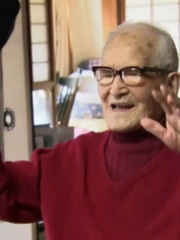
10. Jiroemon Kimura (1897 - 1897)
With an HPI of 74.98, Jiroemon Kimura is the 10th most famous Japanese Politician. His biography has been translated into 41 different languages.
Jiroemon Kimura (Japanese: 木村 次郎右衛門, Hepburn: Kimura Jirōemon; 19 April 1897 – 12 June 2013) was a Japanese supercentenarian who was the verified oldest living person between Dina Manfredini's death on 17 December 2012 and his own death at age 116 years and 54 days on 12 June 2013. Kimura became the oldest verified living man in the world on 25 September 2011 at the age of 114, upon the death of Peru's Horacio Celi Mendoza, and later also the oldest man in history whose lifespan is verified on 28 December 2012, when he surpassed the age of Christian Mortensen (1882–1998). He is the only verified man who has lived to age 116, and one of only six men known to be the oldest living person. After 113-year-old James Sisnett's death on 23 May 2013, Kimura was the last surviving man born in the 19th century.
People
Pantheon has 379 people classified as Japanese politicians born between 711 BC and 2001. Of these 379, 70 (18.47%) of them are still alive today. The most famous living Japanese politicians include Lee Myung-bak, Sanae Takaichi, and Yoshihide Suga. The most famous deceased Japanese politicians include Hirohito, Emperor Meiji, and Toyotomi Hideyoshi. As of April 2024, 15 new Japanese politicians have been added to Pantheon including Sanae Takaichi, Vanraure Hachinohe, and Hsiao Bi-khim.
Living Japanese Politicians
Go to all RankingsLee Myung-bak
1941 - Present
HPI: 76.35
Sanae Takaichi
1961 - Present
HPI: 73.88
Yoshihide Suga
1948 - Present
HPI: 72.34
Naoto Kan
1946 - Present
HPI: 71.22
Fumio Kishida
1957 - Present
HPI: 70.64
Shigeru Ishiba
1957 - Present
HPI: 70.43
Yasuo Fukuda
1936 - Present
HPI: 70.25
Tarō Asō
1940 - Present
HPI: 69.22
Junichiro Koizumi
1942 - Present
HPI: 69.21
Yukio Hatoyama
1947 - Present
HPI: 68.54
Kōichirō Matsuura
1937 - Present
HPI: 66.48
Yoshirō Mori
1937 - Present
HPI: 65.82
Deceased Japanese Politicians
Go to all RankingsHirohito
1901 - 1989
HPI: 85.25
Emperor Meiji
1852 - 1912
HPI: 82.26
Toyotomi Hideyoshi
1536 - 1598
HPI: 81.12
Hideki Tojo
1884 - 1948
HPI: 78.95
Shinzō Abe
1954 - 2022
HPI: 78.56
Emperor Jimmu
711 BC - 585 BC
HPI: 77.58
Richard von Coudenhove-Kalergi
1894 - 1972
HPI: 77.33
Emperor Kōmei
1831 - 1867
HPI: 75.11
Jiroemon Kimura
1897 - 1897
HPI: 74.98
Itō Hirobumi
1841 - 1909
HPI: 74.86
Sasaki Kojirō
1583 - 1612
HPI: 74.30
Minamoto no Yoritomo
1147 - 1199
HPI: 74.11
Newly Added Japanese Politicians (2025)
Go to all RankingsSanae Takaichi
1961 - Present
HPI: 73.88
Vanraure Hachinohe
HPI: 55.63
Hsiao Bi-khim
1971 - Present
HPI: 52.56
Ümit Özdağ
1961 - Present
HPI: 51.91
Hirofumi Yoshimura
1975 - Present
HPI: 48.91
Kotaro Kiyooka
2001 - Present
HPI: 38.98
Shin'ichi Yumoto
1984 - Present
HPI: 36.79
Suguru Iwazaki
1991 - Present
HPI: 36.58
Takehiro Kashima
1980 - Present
HPI: 35.35
Yuko Nakanishi
1981 - Present
HPI: 35.03
Yukiko Ebata
1989 - Present
HPI: 34.52
Evelyn Mawuli
1995 - Present
HPI: 34.51
Overlapping Lives
Which Politicians were alive at the same time? This visualization shows the lifespans of the 25 most globally memorable Politicians since 1700.


